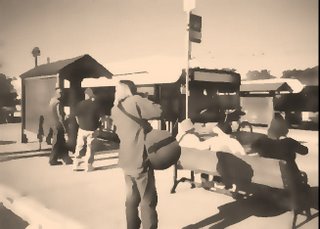
There came a question during one of those distracting and always fun bull sessions about matters a particular clatch has a passing knowledge of as to whether contemporary poets are more interested in the eccentricities of the page appearence rather conveying a discernable message. A wide open topic, choice for PBS talk radio shows where a host tosses out one broad thesis after another, letting the dogs sniff it out and tear it apart. Among my group, the wear and tear on the intellect was a minor concern; this wasn't lifting weights. The gentleman who posed the question wasn't a reader of poetry, at least not for pleasure; it was a field he perused so he can gather examples of lexical sin against an enemy he's constructed. Some folks just can't have enough strawmen in their lives. My argument didn't satify his yearning for an admission of elitism on my part, but it did me good to form some thoughts about my general attitude toward poetry. Good writing is what I needed to be engaged, I said at last, but the problem was really in the expansion of what "good writing" is. It's not a template applicable in all circumstances, without change. There are infinite variations on a common ground.
The poets I like have to be good writers, first and foremost, no matter what their work looks like on the page. There are many writers whose works are stunning to look at as a kind of typographical art, but reading them winds up being an insufferable experience, unpleasant not so much because the poems are difficult but more because the writing is just plain awful, being either willfully obscure to disguise a lack of any real feeling toward their experience, or, most typically , for exhibiting an inane, unoriginal and cliche choked sensibility that would never have gotten out of a junior college poetry workshop.
In either case, the visual look of a poem is a distraction from the mediocrity of the piece being read. Good writing always matters, and there are many , many wonderful poets whose works have an originality achieved through a mastery of language that fortunately leads us away from the nagging dread that a tactless and unschooled Avant Gard has completely overtaken the conversation.
All good poets must be concerned with language,I think, since that is the stock and trade of the art. Language made fresh, reinvigorated, reinvented-- I have no arguments with anyone who earnestly attempts to make language convey experience, ideas, emotion, or even the lack of emotion, in ways and with techniques that keeps poetry and poetic language relevant to the contemporary world, the one that's currently lived in, but there is a tendency for a good many young poets , fresh from writing programs, to repeat the least interesting ideas and execution of their professors and to make their work obsess about language itself, as a subject.
The concern, boiled down crudely, is that language is exhausted in its ability to express something fresh from a imperialist/patriarchal/racist/individualist perspective, and the only thing that earnest writers can do is to foreground language as their subject matter and investigate the ways in which proscribed rhetoric has seduced us and made our work only reinforce the machinery that enslaves us.
This kind of stuff appeals to the idealist who hasn't had enough living, not enough bad luck, not enough frustration or joy to really have anything to write about, in large part (an grotesque generalization, I know), and it's easy for someone to eschew the work of absorbing good poetry -- Shakespeare, Stevens, Whitman, Milton, Blake, O'Hara-- or learning something of the craft and instead poise their work in nonsequitors , fragments,
cliches, sparsely buttressed inanities, framed , usually, in typographical eccentricities that are supposed to make us aware of the horrific truth of language's ability to enslave us to perceptions that serve capitalist and like minded pigs.
More often, this sort of meta-poetry, this experimental notion that makes a grinding self-reflexivity the point of the work, reveals laziness and sloth and basic ignorance of the notion of inspiration-- the moment when one's perceptions and one's techniques merge and result in some lines, some honest work that cuts through the static thinking and makes us see the world in way we hadn't before.
I speak, of course, of only a certain kind of Avant Gard, one I endured in college and have since survived when I found my own voice and began to write what I think is an honest poetry. With any luck, some of these writers will stop insisting on trying to be smarter and more sensitive than their readership and begin to write something that comes to resemble a real poetry that's fresh and alluring for its lack of airs. Others might do us a favor and get real jobs. Others, I think, will continue to be professional poets as long as their is grant money to be had, and will continue in their own destruction of forest land .






